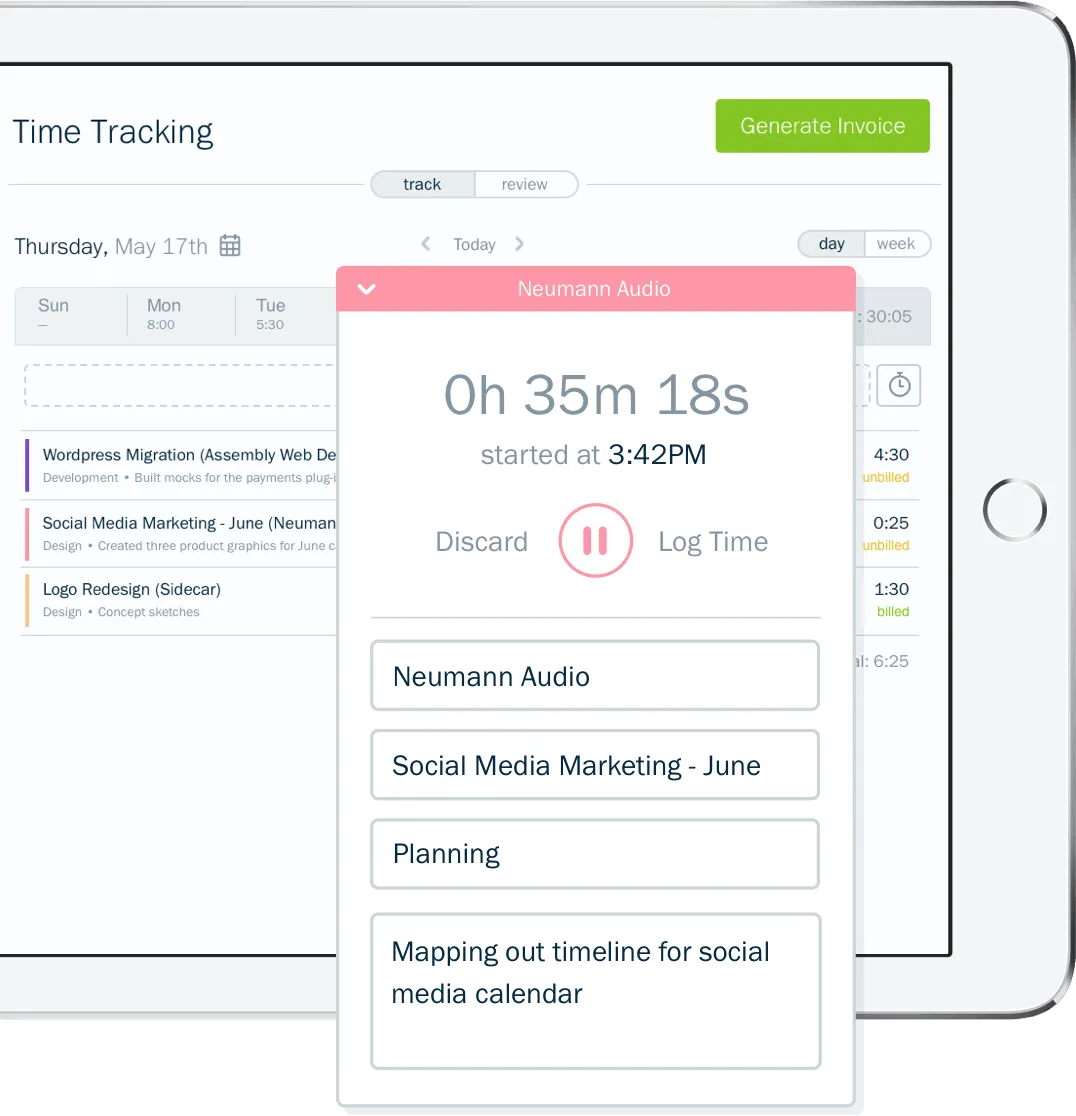The Importance of Time Management: Tips for Productivity

Small businesses and freelancers need to maximize the time they have available to grow their business and proper time management skills can help do that. Time management is important for busy companies so they can prioritize all their work tasks and achieve their goals faster. When you better manage your time, you’ll be able to take on new opportunities and grow your business in a sustainable manner.
Key Takeaways
The importance of time management skills can’t be overstated, especially for small business owners. Here’s what you need to know about this important skill set:
- Time management skills can take time to develop and apply consistently to your life, but the process isn’t too complex.
- Good time management offers countless benefits, including improved work-life balance and a more efficient professional life.
- Time management will help you win new business and maintain your current clients.
- Getting started with time management doesn’t need to be difficult—you can start today.
These topics explore the importance of time management and offer tips for improving your productivity at work:
Why Is Time Management Important?
What Is Time Management?
Time management is the strategy of planning out your available time and controlling the amount of time you spend on specific tasks to work more efficiently. Better time management means a better work-life balance. Work-life balance creates numerous positive benefits like decreased stress and more time for family and loved ones.
Time management can look very different between people, depending on their role in an organization and the goals they want to achieve. For a business owner, time management might limit the time spent on more basic tasks in order to focus on the bigger picture. For an independent freelancer, the goal of time management might be to ensure each client gets the time they deserve without also taking up too much time.
Effective time management comes easier to some people than others, but everyone can develop habits to improve their time management skills. Without strong time management, your work and well-being can suffer. It can lead to:
- Producing poor-quality work
- Missing deadlines
- Increasing your stress levels
- Ruining your work-life balance
- Harming your professional reputation

Benefits of Time Management
Here are 7 benefits of proper time management:
1. Improve Your Performance
When you learn to block time out of your day for all your important tasks, you’ll have a better idea of everything you need to accomplish and how long each task should take. When you have a schedule to follow, you’ll likely find that you spend less time deciding what to work on or procrastinating and more time getting down to important work. Time management can help you focus on the essential tasks ahead of you and avoid time-consuming distractions.
2. Produce Better Work
When you’re not constantly racing to meet a deadline, you can put more effort and think into your work. Time management helps you prioritize your tasks to ensure you have enough time to complete every project. The quality of your work increases when you’re not rushing to complete it ahead of a fast-approaching deadline.

3. Deliver Work on Time
Properly managing your time involves assigning every task on your list to a specific block of time. Many people use time management to allow themselves several days to complete a project or finish it before the due date to provide a buffer for any challenges that may arise. If you properly schedule the time needed to complete your work, you can hit your deadlines every time.
4. Reduce Your Stress
It’s easy to become anxious when you have a full list of tasks to accomplish both for work and in your personal life. Good time management can help you prioritize your to-do list and set aside the time needed for your most important tasks so you know exactly what you need to do and how much time you have available to complete everything. Prioritizing your tasks and giving yourself enough time to accomplish them can help reduce your stress levels.
5. Improved Career Opportunities
Time management can help you become a more reliable employee who always submits high-quality work by your due dates. This, in turn, will make you more valuable as a worker and improve your professional reputation, which can help you find new opportunities to expand your career.
6. Boost Your Confidence
When you manage your time properly and successfully meet your deadlines, you’ll feel a sense of accomplishment and confidence in your abilities. Consistently finishing your daily to-do list is a huge motivator that can drive people to further improve their time management skills and take on new work opportunities.
7. Become More Efficient
When you understand how to do time management effectively, you’ll become more focused at work which allows you to accomplish more with less time available. For example, instead of trying to work on a big project when you have fifteen minutes free before a meeting, you can accomplish a few small tasks in that time and save the bigger tasks that require more brain power for when you have a large block of free time. You’ll be able to work more efficiently to achieve more with less time.
Why Is Time Management Important?
Time management has many benefits to your professional life and overall work-life balance. Time management is important: it helps you keep your workday under control, allowing you to build your business without sacrificing your personal life.
Good time management skills take time to develop and put into practice. But as you learn to manage time, you’ll notice the days take less effort to achieve the same results. You’ll save time on tasks, maintain better energy and productivity levels, and experience less stress as you work through your to-do list.
Are you looking for an online solution for time management that’s easy to use but still contains all the features you need? FreshBooks time tracking is here to help. Our time management software allows you to easily track your dedication to certain projects, tasks, or clients. Plus, you can easily generate time-tracking reports to gain greater insights into how you (and your team) spend your time at scale.
FreshBooks time tracking is also a great way to track billable hours for your clients, create detailed action plans, and manage your days more effectively.
Get a free trial of FreshBooks time tracking software by clicking here.

Time Management: The Basics
For most people, it’s easy to understand why learning the basics of time management is so beneficial—the importance of time management skills cannot be understated. However, implementing them into your daily life to be more productive while creating a better work-life balance can be more complex.
Improving your time management skills can make you more productive and less stressed. Here are 5 easy steps to improve your time management:
Plan Ahead
Planning your time in advance is the most important element of good time management. Understand when you’re most productive: maybe you’re most alert first thing in the morning, or perhaps you hit your stride at night. Save your most important and challenging tasks for when your productivity is highest. Schedule simpler or smaller tasks for times when you’re less alert. Get a good sense before you start each day of how much time you’ll spend working on everything on your task list.
Prioritize Tasks
Evaluate every project you need to work on to determine what tasks are the most urgent and important and make those your top priority for the day. Leave less important tasks or projects that haven’t yet become urgent for later when you have more time to focus on those less crucial projects.
Eliminate Distraction
Distractions are one of the biggest productivity killers. Social media sites, smartphones, and disruptive coworkers can all distract you from your priorities and derail your schedule. According to a study by Think Money, a third of employees are distracted for as much as three hours of the workday. If you find certain distractions are too tempting, consider leaving your smartphone locked in a desk drawer during the day or using a browser extension to block the websites that are most distracting to you.
Don’t Multitask
Multitasking may seem like a good way of getting extra work done, but in reality, it actually decreases your productivity. Instead of completing multiple projects, you start but don’t finish any of them. The best way to manage your time is to focus on a single task at a time and give it your full attention while you’re working on it to avoid mistakes.
Reward Yourself for Good Work
Rewards can be a great motivator for effective time management skills. Give yourself a small reward for every task you accomplish in the day. For instance, you could celebrate finishing a report by taking a 15-minute walk outside. Rewards keep you motivated on the job and can help you achieve a better work-life balance.

Conclusion
What if you could enjoy more free time and money? Time management is the key to unlocking this crucial work-life balance. Effective time management skills are paramount to your success as a small business owner. Time management helps you to achieve greater focus. It helps build positive habits for your life. And it helps you handle busy schedules with less stress than ever.
These essential time management skills have many, many benefits for those willing to practice them. Not all of these tips and methods can be picked up overnight, but with dedication, they’ll soon begin to pay off for you, your team, and your business. Small business owners achieve more when they take their time management as seriously as their money.
If you’re looking for a time management tool to help you stay focused and on track, FreshBooks is here to help. Our time tracking software is a great way to get a birds-eye-view of how you spend your time, helping to eliminate stress and strike a good balance between the things that matter in life.
Click here to try FreshBooks for free.
FAQs on the Importance of Time Management
More questions on the importance of these essential time management skills? Here are some of the most frequently asked questions on the topic.
What are good time management skills?
A lot goes into good time management, but there are a few key aspects to focus on. These include prioritization and delegation of tasks, goal-setting, scheduling, objectives, strategic thinking, and record-keeping. The more these skills you master, the more effective you’ll be in day-to-day tasks.
How can effective time management improve work-life balance?
When you practice time management, you’ll find that many tasks take up less time than before. Structure is important when outlining and executing your plans because it helps you stay focused on the task at hand. The more time management skills you employ, the better work-life balance you’ll have. You’ll enjoy free time to be creative, develop new ideas, or simply relax.
What are the benefits of using technology to manage time effectively?
For the deepest insights into how you use your time, you need detailed time management records to look back at. These can be used to forecast time commitments for future tasks, allowing you to plan accordingly. Keeping these records manually, however, would be an example of poor time management. Time-tracking software is a way to use automation to your advantage, ensuring you never waste time while trying to save it. Read our post on the Best Time Tracking Software to find the right software based on your needs.
What are some common time management mistakes people make?
Common time management mistakes include taking on too much and refusing to delegate, underestimating the actual time a task will take, procrastination, or overextending while attempting to multitask. Avoiding these missteps will ensure you make the most of your time, improving productivity and work-life balance.
What are the consequences of poor time management?
For those who fail to manage their time properly, it can lead to issues like poor work-life balance, wasted money on inefficient approaches, professional relationship problems with peers, clients, and collaborators, and decreased focus overall.
About the author
Michelle Alexander is a CPA and implementation consultant for Artificial Intelligence-powered financial risk discovery technology. She has a Master's of Professional Accounting from the University of Saskatchewan, and has worked in external audit compliance and various finance roles for Government and Big 4. In her spare time you’ll find her traveling the world, shopping for antique jewelry, and painting watercolour floral arrangements.
RELATED ARTICLES


 How to Project Manage?
How to Project Manage? What Are the Project Management Processes?
What Are the Project Management Processes? Why Is Project Management Important? Because It Provides a Detailed Plan
Why Is Project Management Important? Because It Provides a Detailed Plan 16 Tips on How To Organize a Business
16 Tips on How To Organize a Business Improve the Efficiency of Your Employees: 10 Proven Tips for Small Businesses
Improve the Efficiency of Your Employees: 10 Proven Tips for Small Businesses 15 Hacks for Improving Efficiency in the Workplace
15 Hacks for Improving Efficiency in the Workplace